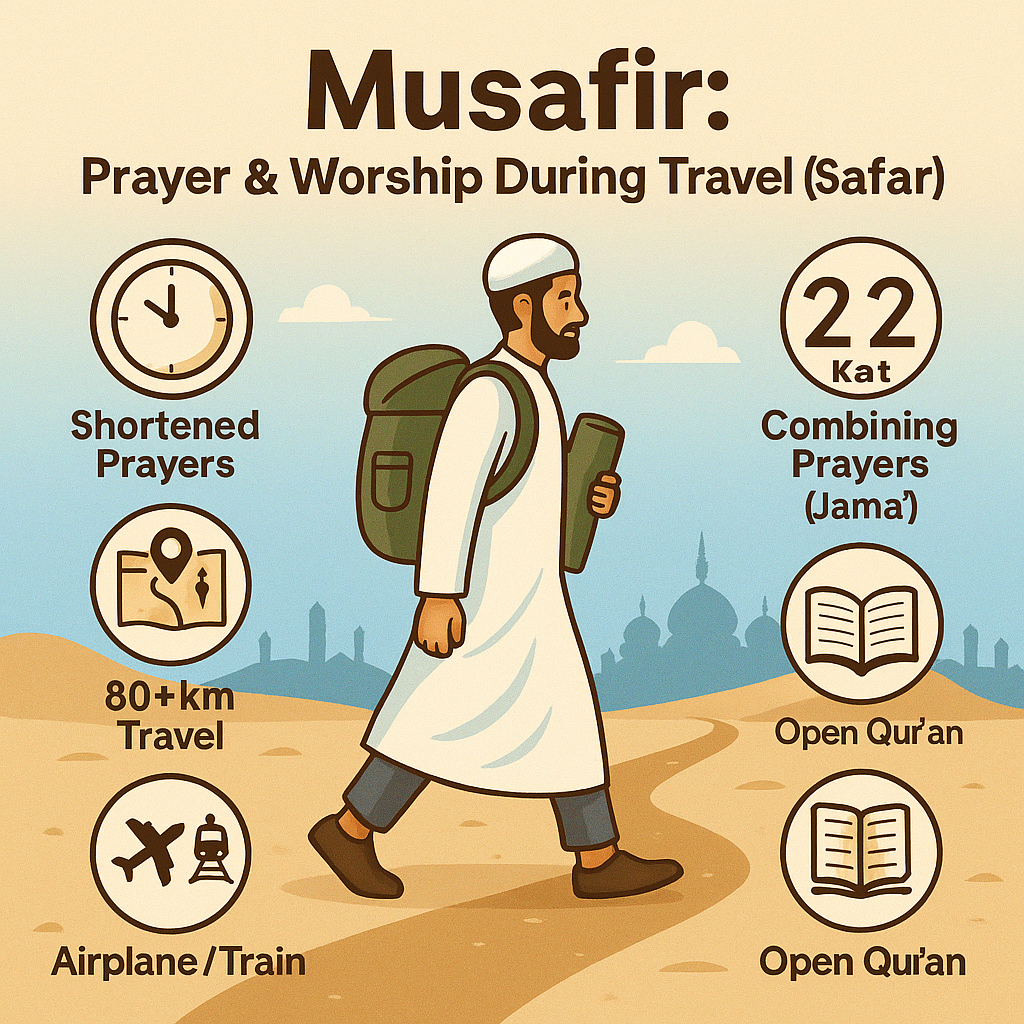🕌 Musafir: Prayer & Acts of Worship During Travel
What does Musafir mean? In Islamic terminology, a Musafir refers to a traveler who undertakes a journey over a certain distance. This status grants specific concessions (rukhṣah) in performing religious duties — such as prayer and fasting — as a manifestation of Allah’s mercy and ease for His servants while traveling.
ElysianGo
9/23/20252 min read


🧭 Traveler in Islam (Musafir): Prayer & Worship During a Journey
In Islam, a musafir (traveler) is someone who embarks on a journey that allows certain acts of worship to be adjusted for ease and mercy — a reflection of Allah’s compassion for His servants.
This guide helps you understand the rulings, manners, and spiritual wisdom behind worship while traveling (safar).
🌍 When Is Someone Considered a Musafir?
A person is regarded as a musafir when:
Their journey covers a distance of around 80–90 km (50–56 miles) or more.
The travel is done for a permissible or righteous purpose, not sinful acts.
The traveler intends to return home after completing their journey.
Once these conditions are met, the traveler is entitled to the rukhshah (concessions) Allah has mercifully provided.
🕌 Prayer Concessions for Travelers
Islam makes prayer lighter and easier for those on the move. These are known as rukhsah — divine relaxations that simplify worship without diminishing its value.
1. Qasr Prayer (Shortened Prayer)
A musafir may shorten four-rak‘ah prayers (Dhuhr, Asr, Isha) into two rak‘ahs.
This is a sunnah practice that the Prophet ﷺ observed during every journey.
2. Jama‘ Prayer (Combined Prayer)
Travelers may combine Dhuhr with Asr and Maghrib with Isha, either:
Jama‘ Taqdim (praying both at the earlier time), or
Jama‘ Ta’khir (delaying both to the later time).
3. Tayammum (Dry Ablution)
If water is not available or using it causes hardship, the traveler may perform tayammum using clean soil or dust — a mercy that keeps worship accessible anywhere.
🌙 Fasting (Sawm) for Travelers
A musafir may postpone fasting during Ramadan if the journey causes difficulty or fatigue.
The missed fasts should later be made up once the traveler returns home and conditions are easier.
“And whoever is ill or on a journey – then an equal number of days [are to be made up] later.”
(Qur’an, Al-Baqarah 2:185)
🌸 Etiquette of a Traveler in Islam
1. Set a Good Intention
Begin the journey with a sincere niyyah — seeking Allah’s pleasure, knowledge, safety, or service to others.
2. Recite the Traveler’s Supplication
“Subhānalladhī sakhkhara lanā hādhā wa mā kunnā lahu muqrinīn...”
Recite this dua when boarding a vehicle, remembering that all movement is by Allah’s will.
3. Maintain Good Manners
Be kind, patient, and humble throughout the trip. The journey tests both body and heart, and true worship lies in preserving akhlāq (character).
🌤️ Conclusion
Traveling is not just a physical act — it’s a spiritual journey that reveals humility and dependence upon Allah.
By following the prophetic guidance on prayer, fasting, and manners, a musafir transforms every mile traveled into an act of worship and remembrance.
“The world is a bridge; cross it, but do not build upon it.”
“Travel light, pray deeply — and let every step bring you closer to Allah.”
ElysianGo Baitullah
ABOUT ELYSIANGO
PARTNERSHIP & AFFILIATES
TRUST & COMMUNITY
© 2025 ElysianGo Baitullah. All rights reserved.
TRAVEL PACKAGES
PILGRIM GUIDES
LANGUAGE OPTIONS
FOLLOW US
Global Umrah-Hajj Ecosystem – Trusted, Guided, Blessed.


Stay inspired and connected with ElysianGo:
